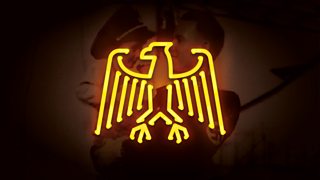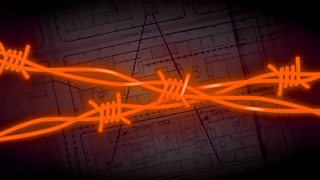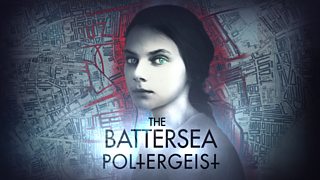What happened after Nuremberg?

A trial always ends abruptly – the verdict may be eagerly awaited but once delivered there is nothing left for the lawyers or judges to do.
In the case of the Nuremberg war crime trials after WW2 (recreated in Radio 4's drama-documentary series, Nuremberg) the authorities were ready for executions and prison sentences, but not acquittals...
Writer and director Jonathan Myerson explains what happened in the immediate aftermath of the trials.
The Nuremberg sentences were pronounced on the 1st of October, 1946. By the 2nd of October, they were all back in London or Washington or Paris. In fact, most of the Russian contingent had left the day before, stripping their allocated houses of everything detachable and trucking it over the border at midnight.
But the prison staff still had plenty to do: Commandant Andrus had prepared for both executions and prison sentences but was blind-sided by acquittals. With outraged and hostile German crowds gathering outside, the three free defendants were forced to resume prison life – he moved them up to an unguarded tier – until they could be hustled out. But it was only a matter of time before they were run to earth. All three – the banker Schacht, Von Papen the one-time Deputy Chancellor and, unluckiest of all, Hans Fritsche, the low-level broadcaster – ended up on trial in German courts.
Spandau
The seven sentenced to imprisonment were sent to Spandau Prison in Berlin where they served their sentences in full. Albert Speer, Hitler’s favourite architect, although forbidden to write any kind of memoir, managed to smuggle out 20,000 pages. After his release on the 1st of October, 1966, his books became best-sellers and he was soon in demand for interviews and lectures round the world. In London for another 大象传媒 interview, he died of a cerebral haemorrhage at St. Mary’s Hospital in 1981.
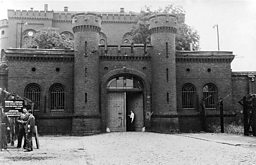
While the French lawyers mostly returned to academic posts, the British lawyers went on to illustrious careers. Elwyn Jones, the young Welsh prosecutor, would go on to prosecute the Moors Murderers and later became Lord Chancellor in Harold Wilson’s Labour Government.
Iona Nikitchenko, the Russian judge, seems to disappear. Did he anger Stalin by his failure to secure death sentences for all?
Mervyn Griffiths-Jones became Treasury Counsel at the Old Bailey, prosecuting Ruth Ellis (the last woman to be hanged in Britain), Stephen Ward (Christine Keeler’s "procurer") and, most famously, Penguin Books for obscenity. During the 1960 Lady Chatterley's Lover trial, he asked the jury if they would wish their “wife or servants to read" D H Lawrence's novel. Unsurprisingly, Penguin was acquitted.
Sir Geoffrey Lawrence, President of the Court, became Baron Oaksey whereas Iona Nikitchenko, the Russian judge, seems to disappear. Even since the Kremlin archives have been opened, there is no trace of him. Did he anger Stalin by his failure to secure death sentences for all? Or maybe he just quietly retired to his dacha...
Friedrich Paulus, the German General captured at Stalingrad and surprise Russian prosecution witness at the trial, had to wait for Stalin’s death in 1953 before he was released. He was granted an honorary post as an army archivist in Dresden and died three years later from Motor Neurone Disease.
Witnesses
Many of the Nazi witnesses at the first trial became defendants at subsequent Nuremberg Trials. Throughout the "first" Nuremberg Trial, there had been constant discussion of what should follow.
By 1946, any hope of future Allied tribunals was long gone. The Iron Curtain had descended across Europe (Churchill actually coined the phrase for a speech during the first trial) and multi-national trials would not resume until it came down.
But as Nuremberg was situated in the American Zone of Occupation the US opted to proceed alone with 12 more trials in the same courtroom: the Doctors, the Judges, the SS Officers and so forth. Men like Otto Ohlendorf, the SS Commander who had testified to the 90,000 Jews he executed, were now in the dock.
Each trial resulted in death sentences, prison sentences and acquittals. But as the last trials ground through 1948, both public and governments had lost interest.
What’s more, by then, NATO needed West Germany as the front line against the Soviet Bloc – German public opinion needed to be appeased.
My father was Hitler's lawyer
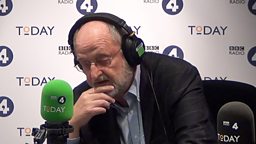
Niklas Frank speaks about the personal responsibility of his father, Hans Frank, who was Adolf Hitler's personal lawyer, and head of the General Government in Nazi-occupied Poland during the Second World War. He was sentenced to death at the Nuremberg trials, and executed. (From Radio 4's Today programme.)
Amnestied
So the trials were drawn to a discreet close and, most shockingly, by the mid-1950s, nearly all these "subsequent" Nuremberg inmates had been amnestied and released from prison.
But Spandau Prison was run jointly with the Russians and they flatly vetoed early release for the seven prisoners there. As a result Rudolf Hess, the only one sentenced to life imprisonment, died there in 1987, in spite of humanitarian pleas from the British Government.
He was 93 and had spent two decades as its only prisoner. To prevent it becoming a shrine, Spandau was then demolished and thus the last physical remnant of the first Nuremberg Trial was finally gone.
-
![]()
Nuremberg
Experience the trial of the most notorious Nazi War criminals through the epic podcast series. Starring Natalie Dormer, Freddie Fox, Kate Phillips, Alex Kingston, Ed Stoppard and Henry Goodman with a company of 25 actors.

Compelling prodcasts on Radio 4
-
![]()
The Ratline
Philippe Sands investigates the mysterious disappearance of senior Nazi Otto W盲chter in a story of love, denial and a curious death.
-
![]()
Tunnel 29
Helena Merriman tells the extraordinary true story of a man who dug a tunnel right under the feet of Berlin Wall border guards to help friends, family and strangers escape.
-
![]()
Mayday
Mayday: When James Le Mesurier fell to his death he left behind a tangle of truths and lies.
-
![]()
The Battersea Poltergeist
A paranormal cold case, re-investigated through a thrilling blend of drama and documentary.

